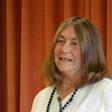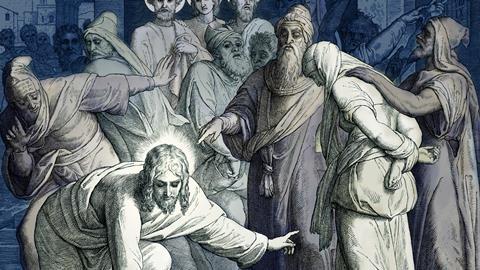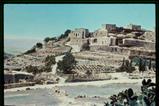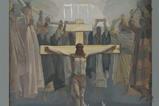Violence against women was occurring in biblical times – and still is today. Elaine Storkey urges us to realise that God’s intervention comes through other human beings
Study passages: Psalm 72:12-13, Psalm 82:3-4
Every day in news broadcasts we hear tales of people who suffer at the “hand of the wicked” (Psalm 82:4). Newscasters sometimes warn us that “the scenes you are about to see are distressing”, as cameras focus on victims of cruelty, neglect, violence and war. Bombed cities, women and men weeping over their dead, children disfigured by malnourishment and dehydration all remind us that the fruits of evil are everywhere. It’s around three millennia since the psalmist wrote the words in our study passages, yet we still live in a world today where the “needy…cry out” and the “afflicted…have no one to help” (Psalm 72:12).
Among those who suffer are women who are victims of physical and sexual violence. In our own advanced democracy there are countrywide refuges and women’s aid centres, which offer safe shelter to those fleeing from domestic assault; over the last decade around 900 UK women have been killed in domestic homicides, the majority by a partner or ex-partner. But in countries marked by constant armed conflict the plight of women is far worse.
Violence towards women in the Bible
We should not be surprised to find stories in the Bible about viciousness and sadism towards women. The biblical authors make little attempt to hide the violations women undergo. The gang rape of the concubine in Judges 19, and the dismembering of her body, is just one awful example. We also read of Dinah, raped by Shechem, the prince of the city (Genesis 34) and Tamar, subject to incest and rape by her half-brother, Amnon (2 Samuel 13). In each case, women were subjected to terrible inhuman treatment by men who used power and force to control them.
Acts of evil sow their own seeds of destruction, whatever the era
These stories in the Hebrew scriptures urge us to reflect on what is happening in our world today. In the biblical narratives, the people who carried out these acts of wickedness came under judgement. The rape of Dinah resulted in a city massacre, carried out by her brothers. The violation of the concubine led to a civil war among the tribes of Israel. And Amnon’s raping of his half sister brought about his own killing by his brother. Acts of evil sow their own seeds of destruction, whatever the era.
Into this setting, the psalmist reminds us that nothing is hidden from God. He sees the acts of the wicked and hears the cries of the oppressed who have no one to help them in their hour of need. In the New Testament, James made a similar point to the Church when the cries of the wronged harvesters reached God (James 5:4). Yet it is still hard to understand the promise that God will liberate victims and rescue them from death. The experience of so many who suffer is that their torture continues and no help comes. So how does God reach the needy and afflicted and bring them to freedom – especially women who experience violence?
God’s care for the afflicted
The Old Testament rarely shows God’s actual intervention in the suffering of women. One exception is in the story of Hagar (Genesis 16), who endured terrible hardship at the hands of her jealous mistress, Sarah, when she became pregnant with Abraham’s child. Hagar, banished to the wilderness, met God in her pain and abandonment and received words of comfort and hope for the future. The experience of being delivered by God was so acute to Hagar that she named God as “the One who sees me” (v13). In the New Testament, God’s intervention is even more evident, as Jesus often met women in their hour of need. Whether it was a woman about to be stoned (John 8:1-11), a woman crippled by spondylitis (Luke 13:10-17) or a woman isolated through perpetual menstrual bleeding (Mark 5:25-34), Jesus’ presence and power was enough to bring deliverance and healing.
Yet, these are all very specific instances and not the normal experience for many people. Most of the time, God’s intervention comes through other human beings. And this is what God intends, for he places on us the responsibility of defending the cause of those who are oppressed and needy. The two statements from Psalms 72 and 82 go together. The psalmist tells us what God is like in his concern for the vulnerable and violated. And then he tells us what we should be like in modelling God’s will for their deliverance. We are the ones who are called to maintain the rights of victims and bring them justice. We are those who must rescue the vulnerable from the hand of the wicked. Offering protection to those at risk, making provision for those who suffer and bringing healing to those damaged by evil are all responsibilities entrusted by God to human beings.
The hands and feet of Jesus
Christians have been called by God to work among the oppressed throughout history and this is still true today. In some of the most dangerous parts of the world, followers of Jesus risk their lives to protect others. We can see this in the Democratic Republic of Congo, which has often been called the rape capital of the world. Constant upheaval and warring militia leave the lives of women there fraught with danger. The fact that the country is mineral rich makes it a perpetual war zone for those who would loot it. Much of the fighting and bloodshed takes place in the east of the country – the North and South Kivu regions. Militia, such as the M23, backed by Rwanda, continue the age-old tribal warfare between Hutu and Tutsi, and cause untold suffering as they destroy villages, homes and people.
One city bears the brunt of most of this: Goma. In a landscape of spectacular beauty, it is in a pivotal area on the Rwandan-Congo border and has witnessed atrocities and murder for decades. It has been surrounded by refugee camps, damaged by volcanic eruption and endured violence and disease caused by breakdown of infrastructures. Yet Goma is also the home of Heal Africa – a Christian hospital founded by a Congolese surgeon, Kasereka ‘Jo’ Lusi and his British missionary wife, Lyn (healafricardc.org). Heal Africa has been God’s tool for putting into practice the mandate in Psalm 82. It is a beacon of hope for healing, with a powerful ministry to women and girl victims of violence and rape.
We are the ones who are called to maintain the rights of victims and bring them justice
For many years Heal Africa has developed holistic treatment for those traumatised by sexual violence. The team has performed thousands of surgical operations, including fistulas, offered medical care and counselling, psychosocial support, treatment for sexually transmitted disease, and emotional and vocational training for the future. It has been at the forefront in ensuring treatments take place rapidly to prevent victims of sexual violence from contracting HIV/AIDS. It has led the way in getting early medication (post-exposure prophylaxis [PEP] kits) to stop HIV infection in children and women exposed to the virus through rape. Victims as young as three have been protected from traumatic illness and death when treated within 72 hours. The team has also tackled the prevention of mother-to-child transmission of HIV.
The girls and women who go to Heal Africa for help know that God is there. They experience God’s rescue and healing in the hospital; they know God is delivering them through the committed work and love of his people. Those who work for Heal Africa know also that God is there through the donors – churches, individuals, charities and national governments – whose overseas aid budgets supply the resource for the provision of equipment and medicines. The training of doctors, surgeons, counsellors, therapists and dozens of ancillary workers all depends on the international community taking this calling seriously. They need to work together to “uphold the cause of the poor and the oppressed. Rescue the weak and the needy; deliver them from the hand of the wicked” (Psalm 82:3-4).
As sexual violence against girl children grows to 30 per cent of rape victims in Congo, sadly a great crisis is affecting Heal Africa and other hospitals. US money, vital for years to fund PEP kits, was withdrawn this year through a presidential executive order; the supply shelves are now empty. By July, staff shared their utter anguish at having to turn away girls and young women who’d travelled from afar to the clinic, desperate for protection. They could give them love, but not the simple kit they needed most to ensure their future.
Heal Africa’s programme of compassionate care for rape survivors has been strikingly successful. Through that and others’, UN data reports a fall in the annual HIV/AIDS death in DRC from 200,000 to 14,000. They have taken their calling from God seriously. Let us pray, urgently, that God will change the hearts of those who do not.


































No comments yet